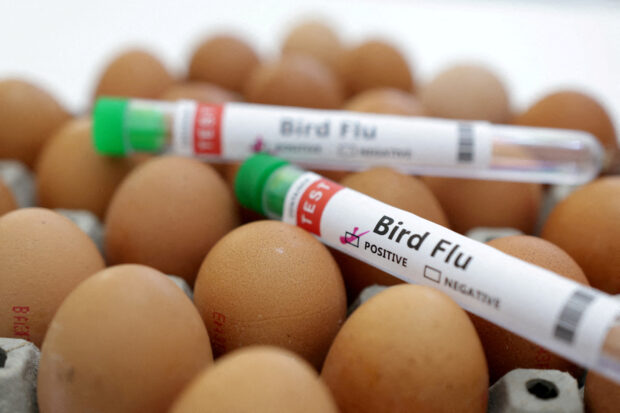Mexico reports first outbreak of H5N1 bird flu on poultry farm

FILE PHOTO: Test tubes labelled “Bird Flu” and eggs are seen in this picture illustration, January 14, 2023. REUTERS/Dado Ruvic/Illustration/File Photo
PARIS — Mexico reported its first outbreak this season of the highly pathogenic H5N1 bird flu on a farm, the World Organization for Animal Health (WOAH) said on Thursday, just a month after Mexico declared it was free of the disease.
The outbreak detected in the northwestern state of Sonora killed 15,000 of a flock of 90,000 laying hens, and the remaining birds were slaughtered, the Paris-based WOAH said, citing Mexican authorities.
“The first outbreak of highly pathogenic avian influenza H5 of this season was reported in a poultry production unit in the municipality of Cajeme, Sonora,” WOAH said in a report.
It added the subtype of the virus found is H5N1, which is not dangerous to humans through meat or egg consumption.
Mexico’s Ministry of Agriculture said in a statement on Wednesday that there was a quarantine in place to prevent the spread.
Article continues after this advertisementThe ministry also said the disease had been detected on another farm three kilometers away, which housed 54,000 birds, where disinfection was underway.
Article continues after this advertisementMexico is one of the top 10 largest chicken meat producers in the world but exports less than 1% of its chicken meat, according to U.S. agency GAIN.
Still, the spread of the highly contagious virus is raising concern among governments and the poultry industry after ravaging flocks worldwide in previous years, disrupting supply, fueling food prices and posing a risk of human transmission.
Russia, South Africa and parts of Eastern Europe have also reported concentrated virus outbreaks in recent months.
Mexican animal safety authorities early last month had confirmed the first case of H5N1 avian influenza in a wild bird after declaring the country’s poultry farms free of the virus earlier in the day.
It comes after Mexico last year launched a large bird vaccination campaign in high-risk areas, including Sonora, to prevent the spread of H5N1.
Another statement from the Agricultural Ministry last week first announcing the detection of the virus said tests were underway to see if “the vaccine applied last year is effective in confronting the virus that entered in 2023.”
A fresh vaccination strategy could begin in the first days of this month, it added.
Mexico’s animal safety agency Senascia has urged local farmers to reinforce biosecurity measures on their farms and to immediately notify of any anomaly observed in their animals to protect the national poultry production, WOAH added.